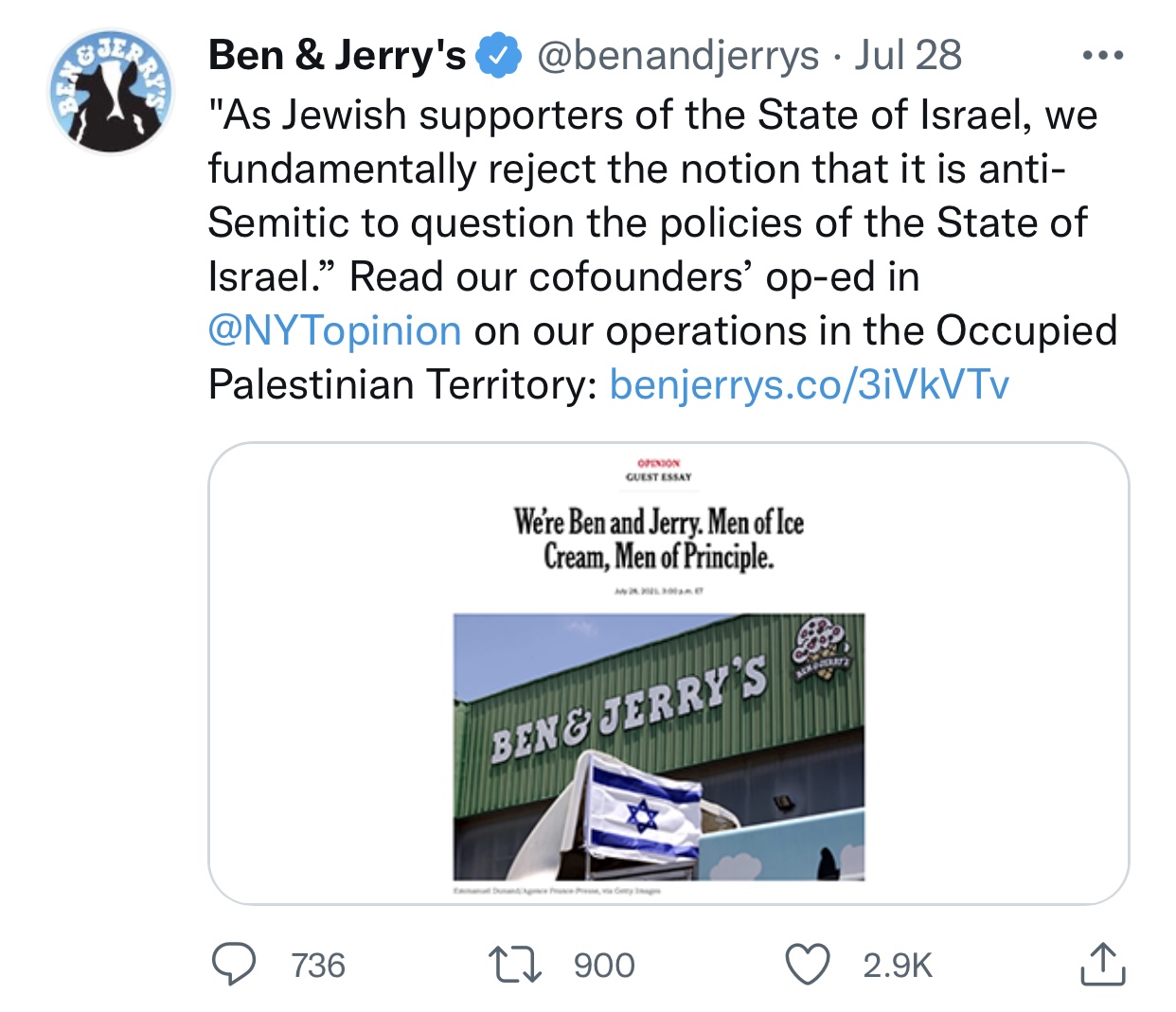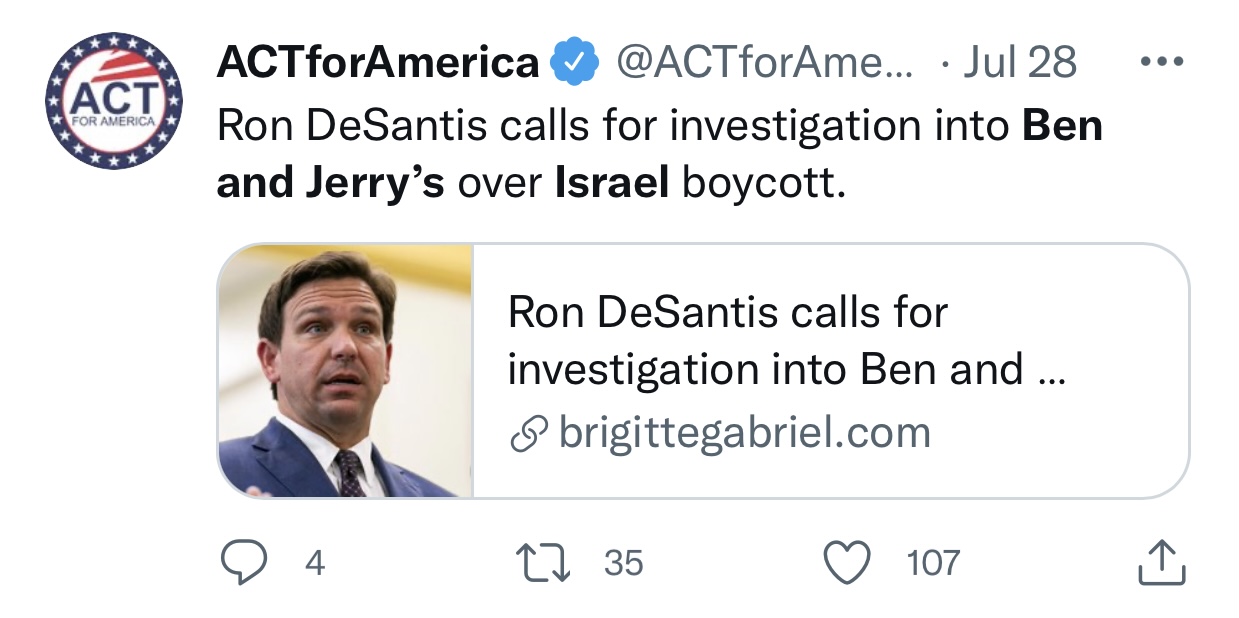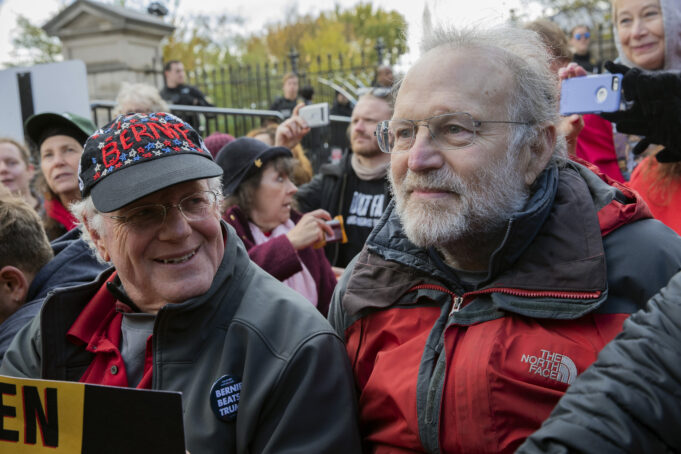Controversy is heating up by the day between the global ice cream maker Ben & Jerry’s and the Zionist State of Israel after announcing it is withdrawing doing business in “Occupied Palestinian Territories” out of protest of Israeli policies against the Palestinian people. The company known for its odd and unique flavored ice cream is also known for its social justice stands.

In response to the July 19 announcement, Israel has embarked on a pressure campaign against Ben & Jerry’s that included a demand on American state governments to enforce anti-boycott Israel laws that exist in over 30 states. The Vermont-based company is a subsidiary of Unilever, the multi-billion dollar food conglomerate. The statement about the move said Ben & Jerry’s was aligning its business with its values.
“We believe it is inconsistent with our values for Ben & Jerry’s ice cream to be sold in the Occupied Palestinian Territory,” said the statement. “We also hear and recognize the concerns shared with us by our fans and trusted partners,” it read.
The statement said the divestment will be implemented in a year and a half when a longtime license agreement with the Israeli manufacturer and distributor of the Ben & Jerry’s brand expires December 2022.
Israeli President Isaac Herzog called the boycott “a new kind of terrorism” designed to hurt Israel’s economy, which must be opposed.

Israel, which enjoys over $3 billion in aid and bipartisan support in Washington, immediately demanded American state governments implement “Anti-Boycott, Divestment, and Sanction” Israel laws against Ben & Jerry’s and BDS advocates. Gilad Erdan, Israel’s UN ambassador, and Yair Lapid, the foreign minister, wrote governors of states with existing anti-BDS laws to enforce against the company.
Mr. Lapid tweeted on July 19: “Ben & Jerry’s decision represents shameful surrender to antisemitism, to BDS and to all that is wrong with the anti-Israel and anti-Jewish discourse,” and added, “We will not be silent.”
Condemnation came from U.S. lawmakers in Washington. In a scathing tweet on July 21, Senator James Lankford (R-OK) threatened a statewide boycott of Ben & Jerry’s Ice Cream and in any state-operated facility to align with the law.
“If Ben & Jerry’s wants to have a meltdown & boycott Israel, OK is ready to respond. Oklahoma has an anti-boycott of Israel law in place,” said Sen. Langford.
Other states like Texas and New York also issued statements threatening boycotts of the ice cream company and its parent company.
The state laws criminalize anyone participating in targeted boycotting, divestment and sanctioning of the State of Israel specifically and takes particular aim at the Boycott, Divestment and Sanctions Movement (BDS) for Palestinian Rights—a global rights collective. Observers told The Final Call in interviews the BDS movement is a group that concerns Israel.
But with the fervor to make Ben & Jerry’s and Unilever pay a price, there are questions on whether the laws are constitutional. Lawmakers have failed attempts to pass the same laws on the federal level.

Opponents of anti-BDS laws like the American Civil Liberties Union have argued they directly infringe on first amendment rights to boycott and reflect “McCarthy era” America when the government engaged in witch hunts and anti-communist loyalty tests on American citizens.
Groups like the ACLU and the Council on American Islamic Relations (CAIR) have sued in state courts on behalf of individuals being denied contracts because of political positions on Palestine.
Legal experts explained the laws take on two forms. One requires government contractors to sign an agreement not to boycott Israel, as part of requirements to be awarded state contracts. The other directs state investment funds to divest from publicly traded corporations that refuse to do business with Israel. Several cases of individuals were ruled unconstitutional by courts as infringements of the right to free speech.
Robert McCaw, CAIR’s director of government affairs, told The Final Call that pushing a large company like Ben & Jerry’s into court would be a precedent that may backfire.
“Any state law that prohibits the first amendment right to boycott, whether its domestic or international is unconstitutional,” said Mr. McCaw. He explained if Ben & Jerry’s as a company wins a case, the law will lose its usefulness as a tool. “These state laws have been challenged … and the majority of time we prevailed and demonstrated that it is unconstitutional to ban Americans from boycotting,” he said.
CAIR has consistently defended the right to engage in the BDS movement, seeking to pressure Israel to meet its obligations under international law.
Ben & Jerry’s—founded in 1978 by two Jewish New Yorkers, Ben Cohen, and Jerry Greenfield—is known for social conscious positions and supporting liberal causes. When Ben & Jerry’s was sold to Unilever in 2000, the founders inked a “unique governance structure” in the agreement that included retaining an independent board of directors to protect the company’s essential brand integrity and continuation of its social mission.
The company’s “social mission” allowed it to openly weigh in on issues like racial justice, environmental issues and often named flavors denoting causes such as “Pecan Resist” or the cookies and caramel packed “Change the Whirled” flavor in partnership with former pro football player Colin Kaepernick, whose financial portion supports his Know Your Rights Camp.
In a New York Times op-ed on July 28, Mr. Cohen and Mr. Greenfield voiced support for Ben & Jerry’s intention to divest from the occupied territories, stating it was the most important decision in its 43-year history. Describing themselves as “proud Jews” they rejected the backlash from the Jewish state which included charges of being anti-Israel and anti-Semitic.
“That we support the company’s decision is not a contradiction nor is it anti-Semitic,” they said. “In fact, we believe this act can and should be seen as advancing the concepts of justice and human rights, core tenets of Judaism,” they added.
The founders argued Ben & Jerry’s is not anti-Israel, nor pro-Boycott, Divestment and Sanctions (BDS) movement, which pushes corporations to stop doing business with Israel. They wrote the decision was a “rejection of Israeli policy” which perpetuates an “illegal occupation that is a barrier to peace” and violates basic human rights of Palestinians.
“As Jewish supporters of the State of Israel, we fundamentally reject the notion that it is anti-Semitic to question the policies of the State of Israel,” they said.
Notwithstanding the careful wording of the founders’ position, the divestment is widely seen as a win for the BDS movement.

Although the decision is consistent with Ben & Jerry’s history of social-justice advocacy, BDS activists told The Final Call, the position came after 10 years of sustained pressure on the company.
Wafic Faour of Vermonters for Justice in Palestine said they spent the last decade educating Ben & Jerry’s executives and board members about Israeli apartheid from the river Jordan to the Mediterranean sea.
“When we tried to tell Ben and Jerry’s you cannot benefit or profit from Israel and you cannot sell your product to Jewish only settlements because it’s against international law, they closed the door in our face, year after year,” explained Mr. Faour.
The activist and businessman sees the move as a victory and he takes the decision “with a positive attitude.” “But they didn’t go far enough,” Mr. Faour said.
He said that as an international company it was already against international law for Ben & Jerry’s to make profits in occupied territories or illegal land.
The UN, other leading international legal bodies and human rights organizations and the U.S., Israel’s closest ally, considers the West Bank to be illegally occupied territory.
Although Ben & Jerry’s will not sell in Occupied Palestinian Territories, it will continue business in Israel through a “different arrangement” to be publicly announced at a later time. In an emailed response to a Final Call inquiry, Ben & Jerry’s said it is not engaging in interviews, only sticking to their July 19 statement.
However, activists are demanding more and staying in battle mode until Ben & Jerry’s “ends all business” with Israel. The Israeli state can’t be separated from its apartheid and military occupation.
“For Ben & Jerry’s to fully commit to justice, there must be no scoops left behind under apartheid,” said Ahmad Abuznaid, executive director of the U.S. Campaign for Palestinian Rights. “Until there are none, we are not done,” he vowed.













